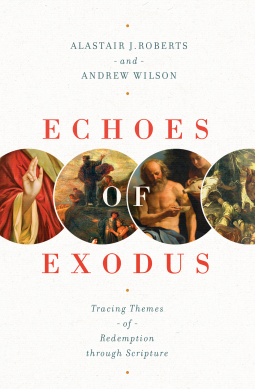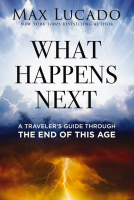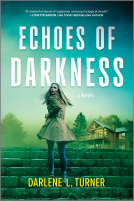
Echoes of Exodus
Tracing Themes of Redemption through Scripture
by ;
This title was previously available on NetGalley and is now archived.
Send NetGalley books directly to your Kindle or Kindle app
1
To read on a Kindle or Kindle app, please add kindle@netgalley.com as an approved email address to receive files in your Amazon account. Click here for step-by-step instructions.
2
Also find your Kindle email address within your Amazon account, and enter it here.
Pub Date Mar 31 2018 | Archive Date Mar 05 2018
Talking about this book? Use #EchoesOfExodus #NetGalley. More hashtag tips!
Description
Exploring the theme of exodus throughout both the Old and New Testaments, this book sheds light on Scripture’s unified message of redemption from slavery to sin through Jesus Christ.
Exploring the theme of exodus throughout both the Old and New Testaments, this book sheds light on Scripture’s unified message of redemption from slavery to sin through Jesus Christ.
A Note From the Publisher
PDF may not be compatible with all reading devices
Advance Praise
“Roberts and Wilson show how the exodus is more than a past event; it is a paradigm that shapes the storyline of the Bible and the life of the believer. The blend of rich biblical theology and beautiful writing will stir the affections of all who long for the Promised Land of the new heaven and new earth.”
—Matthew S. Harmon, Professor of New Testament Studies, Grace College and Theological Seminary
“Alastair Roberts and Andrew Wilson have written a marvelous book. In 160 packed, lucid pages, they explore the exodus, one of the Bible’s main themes from Genesis to Revelation. The authors say that Scripture is musical, and their book will leave haunting echoes of exodus ringing in your soul. Echoes of Exodus won’t just teach you about exodus; it will teach you how to read. In studying it, you will learn to harmonize on the melody of God.”
—Peter Leithart, President, Theopolis Institute; Contributing Editor, Touchstone Magazine
“I treasure books that bring the Scriptures to life, such as this one. This is what biblical theology should look like. This work by Roberts and Wilson taught me a great deal about the Bible and gave me a renewed appreciation for the exodus motif throughout God’s Word. Seminary professors, preachers, Bible study leaders, and others are going to love Echoes of Exodus.”
—Mark Jones, Teaching Elder, Faith Vancouver Presbyterian Church
Available Editions
| EDITION | Other Format |
| ISBN | 9781433557989 |
| PRICE | $17.99 (USD) |
Featured Reviews
 Terry B, Reviewer
Terry B, Reviewer
This was a very though-out book! The author’s found many Types of men who were types of Moses’, because they were leaders who God called out to lead His people over a difficult time period and through difficult circumstances.
God saved Moses and the Israelite people from Pharaoh’s wrath, God sent plagues on the Egyptians to deliver the Israelites from bondage and He destroyed Egypt’s gods. As the Israelites miraculously crossed over the Red Sea, they were miraculously delivered from Pharaoh.
The author’s describe a number of Exodus’-like journeys, the second journey is when Joshua has to lead the Israelites into Canaan over the River Jordan. Israel has to circumcise her men, set up a memorial and celebrate Passover, just like the Israelites did before they crossed the Red Sea. Moses’ leadership is replaced by Joshua, who has to depend on God even more than Moses did.
You will enjoy reading the other Exodus parallels, you may even create some of your own!
First sentence: The exodus is central to the Scriptures, central to the gospel, and central to the Christian life. Whatever book of the Bible you are reading, and whichever Christian practices you are involved in, echoes of the exodus are in there somewhere.
In Echoes of Exodus, the authors argue that the themes of exodus--of deliverance--are to be found in every book of the Bible. The Bible tells a cohesive story of a God who saves, who rescues, who redeems, who restores, who fulfills, who blesses, who loves.
The approach they take to illustrating this is unique. It is a musical approach. They write,
"Scripture is music. We use musical metaphors all the time when we talk about the Scriptures, without even thinking about it. We might describe the Bible as a symphony or a love song. We might refer to the opening of Genesis as an overture or to Revelation as a finale. We might talk about the story being composed or perhaps orchestrated by God, with themes and rhythms and echoes running through it, all building to a crescendo. If we are handling some of the difficult sections, we might say that there is a clash here or a discordant note there, but that there is always, ultimately, a harmony within the Word of God, and therefore that we can expect things to resolve....A musical approach to Scripture encompasses a number of aspects, each of which can help us see Scripture in a fresh light. One, which we have already mentioned, involves the language of tension and resolution...The Bible has a clear storyline, a melody, a tune, and it can be summarized (or sung) by a small child. It also has a range of individual and corporate stories that run together, sometimes taking center stage, sometimes fading into the background, providing harmony and counterpoint, treble and bass, height and depth, in such a way that no single writer (or musician) could possibly represent it all."
The book begins with a discussion of Exodus, of Passover. The book then journeys on through the rest of the Bible going back to Genesis and finally concluding in Revelation.
I would definitely recommend this one! I found it very relevant. Like the authors I agree that modern society is confused about what freedom really is. So often we do focus on being delivered FROM something and never realize we are delivered for a purpose and by design. We are saved from slavery to sin so we can glorify God and enjoy HIM forever.
 Reviewer 409364
Reviewer 409364
An exceptional look at biblical interpretation and its holistic integrity through the lens of the Exodus narrative. An indispensable and concise little book (surprising given that Alastair helped write it!!) that is a worthwhile addition to anyone's library, and a fantastic book to hand out to friends, family, or church members. Highly, highly recommended.
 Reviewer 325206
Reviewer 325206
INTRODUCTION
My oldest son is four years old. As a four year old, he spends a few hours every day in school working through a few pages of his pre-k books, and recently he’s been learning about patterns. He’s learning to look back on the rhythms of the past to predict what will come next in the series as he fills in the blank spaces in his workbook. As a Christian dad, I love the fact that he’s learning about patterns so early because I want him to be able to rightly understand the Bible, a book filled with patterns and themes about creation and fall and redemption that grow and heighten throughout history as they find their fulfillment in the Lord Jesus Christ and his consummated kingdom.
SUMMARY
In Echoes of Exodus: Tracing Themes of Redemption through Scripture, Alastair Roberts and Andrew Wilson employ a musical reading of Scripture to demonstrate how Israel’s defining moment in their exodus from Egypt is part of a greater pattern of redemption for the people of God found throughout the entire Bible pointing to and culminating in Christ. The first movement focuses on the redemption of the people of God seen most clearly in Israel’s exodus from Egyptian bondage and deliverance to serve the LORD in the promised land. The second movement goes back in time to trace the themes of redemption through the book of Genesis while the third movement carries the song forward through the remainder of the Old Testament. The fourth and final movement captures the crescendo of the redemption theme by connecting full and final redemption for God’s people to Christ in his deliverance of us from the kingdom of sin and Satan into his eternal kingdom of light.
CRITICAL EVALUATION
The main thesis of the book that the “exodus is central to the Scriptures, central to the gospel, and central to the Christian life” is clearly proved (9). In the midst of an evil generation worthy of the judgment of God, Noah found favor in the eyes of the Lord and was delivered through the watery wrath of God, just as Israel was delivered through crossing the Red Sea. The authors conclude, “Just as God remembered Israel and led them to a mountain where he gave them a new covenant, new laws, and ultimately rest, so God remembers Noah (8:1) and brings him safely to a mountain, where he receives a new covenant, new laws, and a place of rest” (59).
The same exodus parallels at the beginning of the Bible are also present at the end, which is why one needs less of prophecy charts and more of Exodus in order to understand Revelation. The book of Revelation “begins, like the story of Moses, with awe-inspiring visions of God (chaps. 1, 4) alongside promises of the rescue that will come at the end of the church’s sufferings (2-3). This rescue comes through a slain Lamb, like the Passover lamb, who appears in response to the cries of God’s people, ransoms them, and makes them kings and priests (5)” (154). The authors continue, “The people of Israel are sealed, so that they cannot be destroyed by the judgment coming on the world (7); those “coming out of the great tribulation” (like Egypt; Rev. 7:14) include people from every tribe and nation (like Israel), and they are guided by a shepherd (like Moses) to streams of living water and to serve God in his temple (like the exodus)” (154). This ending is fitting because it reveals to us that the Bible is a “redemption story”, “a cosmic exodus, stretching from Eden to the New Jerusalem” (155).
In the midst of this almost overwhelming whirlwind overview of the themes of redemption found on repeat throughout the Bible, the most helpful contribution of this book is the way that it seeks to ground Christians in the redemptive story of the Bible. The Bible is not a book of systematic theology or merely a Christian reference book. “We are to read about the exodus like we might read about the D-day landings: as a defining history that explains who we are. The exodus is our family story” (10). And as exodus people, being free from sin to serve God in Christ shapes how we live.
“Exodus people know what it is to be ground into the dust by those with power. So whenever we see it happening to others—racial minorities, slaves, trafficked women, the poor, unborn children, refugees, the homeless, those with disabilities, sojourners, orphans, widows—we act….We use our power to serve the interests of those without it, because the exodus was never just for us. Free people free people. And of course, we tell this story” (162). As Christians, we are exodus people called to live in light of the cosmic exodus being fulfilled in Christ as we seek the redemption of people from every nation with the gospel of King Jesus.
CONCLUSION
Echoes of Exodus: Tracing Themes of Redemption through Scripture is another helpful biblical theology book that helps the bride of Christ understand the story into which we’ve been adopted through Christ, which roots us in the story of redemption that God has been telling since creation and shapes our lives in light of it. May this book help us grasp that we are exodus people, and may it help us live as people of redemption in a world in bondage to sin.
 Phil B, Educator
Phil B, Educator
This is one of the best books I've read this year. The authors did an excellent job of explaining Biblical theology without using those words. I loved the way the used music to explain hermeneutics. I really enjoy reading and learning about the unity of Scripture, and this book had a lot of helpful things that I had never considered. The book was written very well, easy to understand, and the review/discussion questions after each chapter would be great for a small group or Bible study.
 Jorge C, Reviewer
Jorge C, Reviewer
This book is excellent. Roberts and Wilson provide a solid biblical theology and the patterns found not just on the Exodus, but throughout Scripture. It resonates well with Biblical Theology lovers who are eager to find "hidden" patterns from Old Testament all the way to the New, especially as fulfilled by Christ. There is a lot in the book which is original or seldom mentioned in the literature, but also a lot which is classic in biblical theology. Overall, the reader won't be disappointed yet will be let wanting for a treatment on subsequent books of the Pentateuch and their relationship with the rest of Scripture. This book, although it is primarily a Biblical Theology treatment, ties to systematic formulations, especially as found in the Protestant tradition. Hope to see more from Roberts and Wilson in the near future.
Readers who liked this book also liked:
Wanda E. Brunstetter
Christian, Cooking, Food & Wine
Colleen Coble and Rick Acker
Christian, General Fiction (Adult), Mystery & Thrillers


















